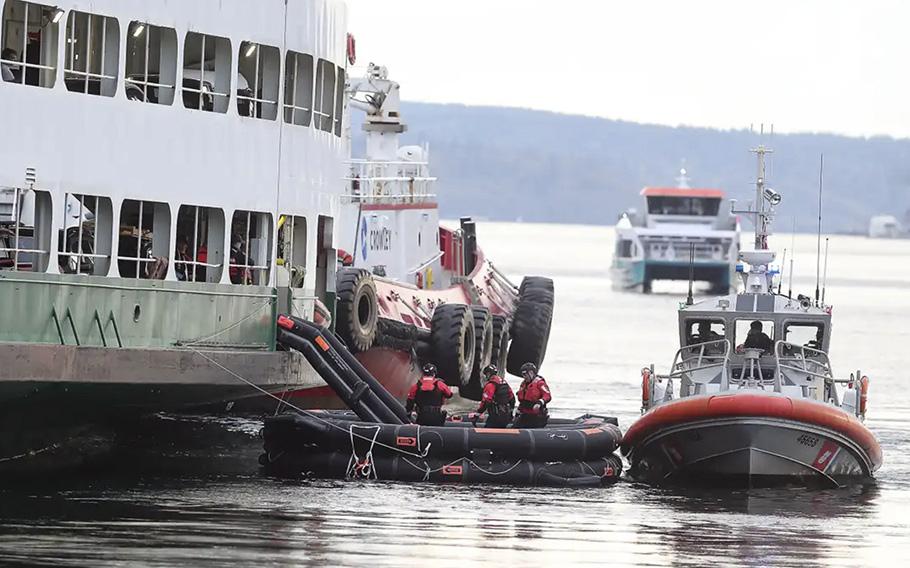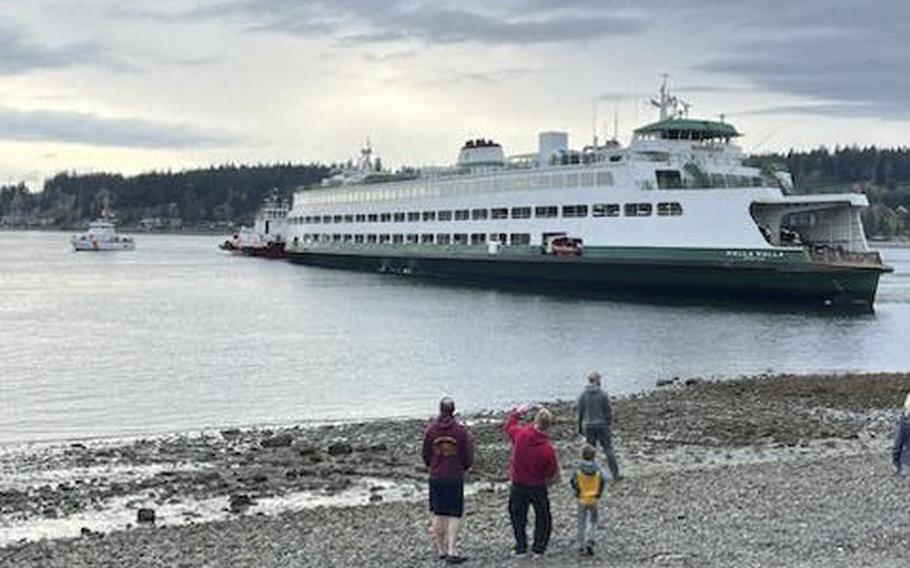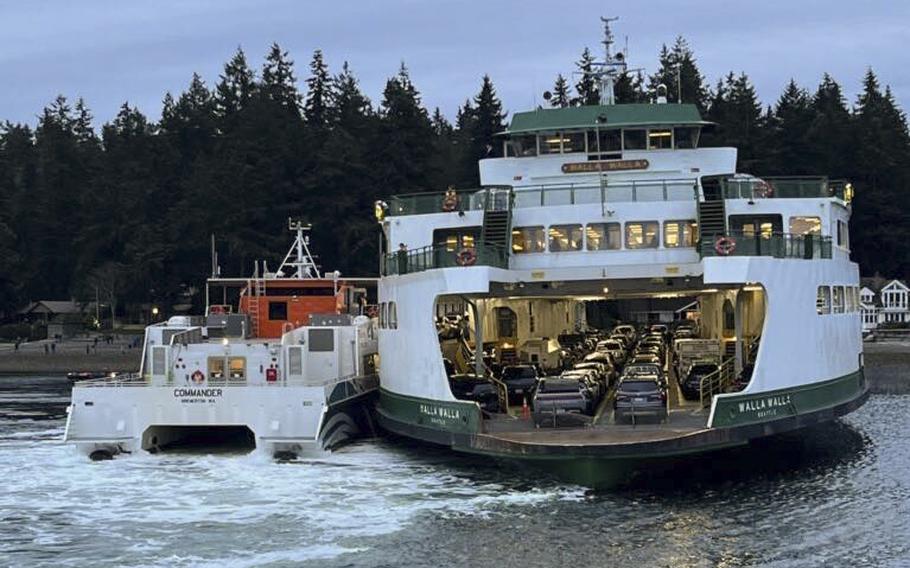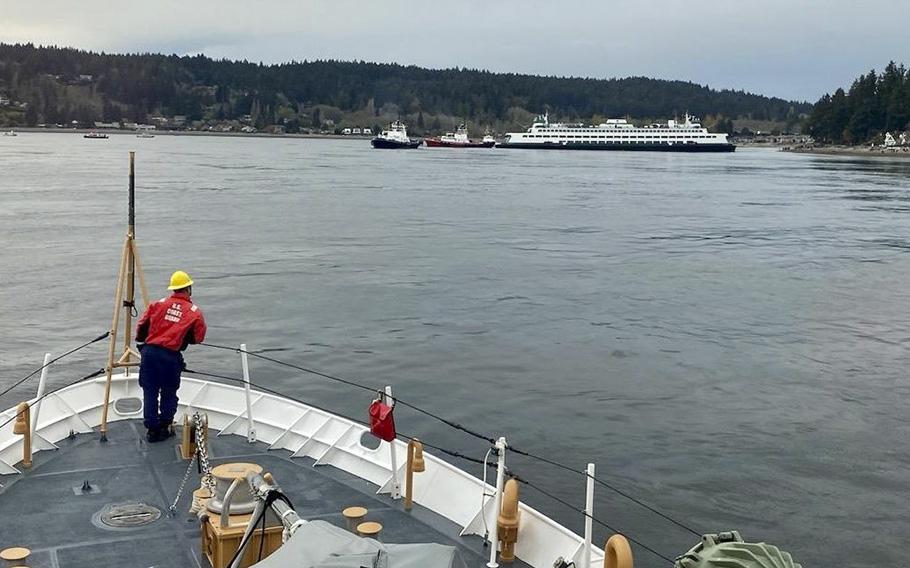
Coast Guard crews and vessels responded to the grounding of the Washington State Ferry Walla Walla in Rich Passage, on Saturday, April 15, 2023. (U.S. Coast Guard/Facebook)
(Tribune News Service) — As the sun set and the tide receded on the beached ferry Walla Walla on Saturday night, the lights aboard the 50-year-old Jumbo class ship grew sharp against the darkening skies.
The image, at once striking and unsettling, stood as backdrop to the state's aging fleet of 21 ferries in need of ever more maintenance simply to keep them afloat.
It's a point Gov. Jay Inslee made from the shores of Bainbridge Island, where he looked on as the nearly 600 passengers were loaded onto rescue boats supplied by Kitsap Transit, an unwelcome marker of the 111th anniversary of the Titanic's sinking.
"Look, we have a very old fleet," he said. "We desperately need new boats. We've known this for a long time."
Lawmakers in Olympia have begun to act, budgeting $1.5 billion over 16 years to build new vessels and convert existing ones to be electric.
But the challenges of completing the new ships go beyond budgeting. Ballooning costs and workforce shortages could mean Washington does something it hasn't done in more than 50 years: build the boats outside the state.
The state is already behind by at least two years, due largely to a breakdown in negotiations with Vigor, the Seattle-based shipbuilder that constructed the last 10 ferries. That means Washington is spending heavily to keep ships functioning when they're due for retirement, like the 64-year-old Tillikum.

Coast Guard crews and vessels responded to the grounding of the Washington State Ferry Walla Walla in Rich Passage, on Saturday, April 15, 2023. (U.S. Coast Guard/Facebook)
The state is in the process of rebidding the contracts for the next five boats. Previous rounds of bidding favored local builders, with the state only looking nationally if the bids came in at 5% or more above the engineers' estimated cost.
But with Vigor sidelined, lawmakers lack confidence Washington will receive enough competitive and affordable local proposals, which would mean running yet another bidding process and using up yet more time.
A bill in Olympia, House Bill 1846, could change all that, opening bidding nationally from the start, allowing yards as far away as Louisiana or Florida to have a chance at constructing the ferries. Under the proposal, local builders would receive a credit on the bid price to give them a slight advantage. It passed both the House and Senate with bipartisan support and now needs to be reconciled before heading to Inslee's desk.
"It was clear that our current model wasn't working," said the chair of the Senate Transportation Committee, Sen. Marko Liias, D-Everett. "We can't pay double for every single boat from here on out. ... As we look at the landscape, unfortunately, there's not a guarantee we can find an affordable boat in Washington. I'm hopeful we can, but we can't wait."
For Washington-based builders, however, the proposal is a gut punch.
"We've been working on this for the last four-five years to be part of this new construction program," said Gavin Higgins, CEO of Nichols Brothers Boat Builders in Freeland, Island County, on the southern end of Whidbey Island. In the relative isolation of Whidbey Island, where the cost of living is skyrocketing, jobs in the boatyard are at a premium for the community, he said. Building five new ferries would mean many years' worth of work.
At the same time, Higgins acknowledged it would be difficult to compete with yards in the south, where the cost of living is less, wages are lower and environmental regulations are lax. He estimates building a boat in Washington adds 20% to the cost.
"We have the skills, we have the capabilities to do the work and we just would like to have a solid chance to be able to do it," he said.

Coast Guard crews and vessels responded to the grounding of the Washington State Ferry Walla Walla in Rich Passage, on Saturday, April 15, 2023. (U.S. Coast Guard/Facebook)
Speaking at beachside Saturday night, Inslee said he's in touch with legislators about the proposal. His preference is for the bill to contain as much local incentive as possible, but there are questions about how much benefit the state can give to Washington companies without running afoul of federal laws governing fair interstate commerce.
"We'd like to do it sooner rather than later," he said of obtaining a contract. "If you do things that can create controversy, it can slow down procurement."
The fragility of the ferry system was on clear display all weekend. Even before the Walla Walla's crash, sailings were canceled between Bainbridge and Seattle due to crew shortages, a chronic issue dating back to 2020 when a wave of retirements, resignations and firings hit the ferry service. The crossing between Bremerton and Seattle has only had one boat for years now, as it's considered a lower priority for normal service than other passages.
Washington State Ferries went 10 years, from 2000 to 2010, without building a new ferry. Eleven of the 21 vessels in use are over 40 years old, including five over 50.
During the summer, 19 boats run at a time when there is full service. Two boats are kept out at any moment for maintenance, meaning that, with 21 boats available — down from 24 in 2016 — there is very little slack in the system. Ferries are regularly pulled from service for emergency repairs, most dramatically seen last summer when the ferry Cathlamet crashed off of the Fauntleroy dock.
Three boats are due for retirement before 2027; the Tillikum was scheduled to be brought out of service this year. But with contracting moving at the current speed, the earliest new ships would arrive is 2027. As a result, the Legislature is likely to budget nearly $20 million this year just to keep the Tillikum running longer.
The Walla Walla beached around 5 p.m. Saturday as it entered Rich Passage on its way to Seattle from Bremerton, after apparently losing power, according to a spokesperson for Washington State Ferries. The U.S. Coast Guard will investigate the cause of the crash, said spokesperson Chief Petty Officer Steve Strohmaier. The crew on board has been drug and alcohol tested, as is standard following any incident.

Coast Guard crews and vessels responded to the grounding of the Washington State Ferry Walla Walla in Rich Passage, on Saturday, April 15, 2023. (U.S. Coast Guard/Facebook)
Passengers recalled the lights flickering, followed by alarms sounding on the boat and the captain warning people to brace for impact. The crash itself was gentle, as the ferry settled on the sandy shores of southern Bainbridge Island.
"It was controlled chaos," said Rhona Jones, who was trying to return home to Seattle on Saturday night but instead spent the night in Bremerton with her son after five hours aboard the ferry.
Roughly 600 people were aboard the ship, all of whom were shuttled off the Walla Walla back to Bremerton via a Kitsap Transit fast boat. That meant, however, that close to 200 cars were left on board.
Tugboats managed to flip the boat around and dock it in Bremerton so cars wouldn't need to reverse their way off. Full details of the boat's failure have not yet been reported, but Washington State Ferries said it appeared to be an issue with the generator. Divers were set to plunge into Puget Sound on Sunday to examine the ship's hull for damage, according to Phil Olwell, relief terminal supervisor with Washington State Ferries.
Beginning at 9 a.m. Sunday, travelers and tow trucks lined up on the Bremerton dock. Over the course of an hour, crew puzzled their way through offloading the ship, wrapping up around 10 a.m.
The ferry Issaquah was shifted to the Bremerton route Sunday. No timeline has been set for the Walla Walla's return to service, Strohmaier of the Coast Guard said. But knowing how thin the system is stretched and how important each boat is, diagnosing and fixing the issues will be expedited, he said.
"We want to make sure why this happened and, if it was a mechanical issue, steps that can be done to fix that," he said.
(c)2023 The Seattle Times
Visit The Seattle Times
Distributed by Tribune Content Agency, LLC.